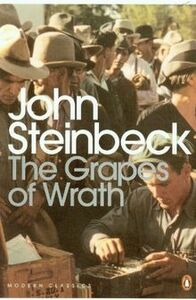Take a photo of a barcode or cover
challenging
emotional
hopeful
reflective
sad
tense
medium-paced
Plot or Character Driven:
A mix
Strong character development:
Yes
Loveable characters:
Yes
Diverse cast of characters:
Yes
Flaws of characters a main focus:
No
sad
slow-paced
Strong character development:
No
Diverse cast of characters:
No
Flaws of characters a main focus:
No
Incredibly well written. Also incredibly realistic and thus very sad. A bit too long.
challenging
emotional
informative
reflective
sad
medium-paced
Plot or Character Driven:
Plot
Strong character development:
Yes
Loveable characters:
Yes
Diverse cast of characters:
No
Flaws of characters a main focus:
Yes
It was the first book I read by John Steinbeck, and honestly, I didn’t expect to enjoy it as much as I did. I was really surprised by how easy his writing is to read (it made it so much easier to get into the story) and I think the fact that I read the new translation really helped me get immersed.
The novel follows the Joad family as they travel to California during the 1920s–30s, hoping to build a better life. What really struck me was how clearly Steinbeck shows the effects of poverty and how unfair the capitalist system can be. That part felt especially real to me, because I live on an island where a lot of young people are forced to leave if they want to find work. The themes in the book (economic struggle, migration, inequality) are still so relevant today.
I’m really glad I gave this book a chance. It was moving, and powerful.
I’m now definitely interested in reading more of Steinbeck’s novels.
I’m now definitely interested in reading more of Steinbeck’s novels.
Graphic: Animal death, Death, Death of parent
emotional
inspiring
sad
medium-paced
Plot or Character Driven:
Character
Strong character development:
Yes
Loveable characters:
Yes
Diverse cast of characters:
Yes
Flaws of characters a main focus:
Yes
This book is second only to East of Eden. This is the great American tragedy.
challenging
dark
emotional
sad
tense
slow-paced
Plot or Character Driven:
Character
Strong character development:
No
Loveable characters:
Complicated
Diverse cast of characters:
No
Flaws of characters a main focus:
No
adventurous
challenging
dark
emotional
informative
sad
medium-paced
Plot or Character Driven:
A mix
Strong character development:
Yes
Loveable characters:
Yes
Diverse cast of characters:
Yes
Flaws of characters a main focus:
Complicated
adventurous
challenging
dark
emotional
informative
reflective
sad
medium-paced
Plot or Character Driven:
Character
Strong character development:
Yes
Loveable characters:
Yes
Diverse cast of characters:
Yes
Flaws of characters a main focus:
Complicated
challenging
dark
emotional
reflective
sad
slow-paced
Plot or Character Driven:
Character
Strong character development:
Complicated
Loveable characters:
Complicated
Diverse cast of characters:
Complicated
Flaws of characters a main focus:
Complicated
Rating my experience: 3.75 out of 5
So, I finally read The Grapes of Wrath by John Steinbeck.
It follows the Joad family, farmers driven from their Oklahoma home during the Dust Bowl and the Great Depression. Hoping for work and a better life, they journey west to California, only to find exploitation and broken promises.
Reading this reminded me that I'm first and foremost an escapist regarding books, movies, etc., but I also get a lot out of going outside that preference. This year has had a lot of that: first To Kill a Mockingbird, then The Book Thief. These books were work for me to get through, but rewarding work.
Let me start by saying that I find Steinbeck's prose wonderful. I thought the same when I read Of Mice and Men, which also holds true here. His writing is eloquent and deeply admirable, especially to someone like me who aspires to master writing as both craft and art.
I'll admit, I expected the Joad family to harvest grapes eventually, so I was a little puzzled by the title. I looked it up, of course, and learned it comes from the 1861 abolitionist hymn "The Battle Hymn of the Republic" by Julia Ward Howe:
Mine eyes have seen the glory of the coming of the Lord;
He is trampling out the vintage where the grapes of wrath are stored;
I'd absorbed the first line through osmosis, but I had not known the second, and have learned it refers to divine judgment. Having finished the book, I understand Steinbeck's title, and the story certainly evokes support for a God-wrath against the bankers and proponents of Social Darwinism. But all of that commentary is expertly placed in what is, at its core, a survival story. The Joad family is simply trying to endure poverty, displacement, and exploitation with little to no resources and a full share of shortcomings.
Like the past two books I recently read that required effort, The Grapes of Wrath is easy to recommend, with the same caveat: if, like me, you prefer stories that balance plot movement with character development, you won't get that here. Instead, you will get a powerful, deeply American novel about a family's struggle to hold together under brutal conditions. I've said something like this before: this one was work to read but rewarding to finish.
So, I finally read The Grapes of Wrath by John Steinbeck.
It follows the Joad family, farmers driven from their Oklahoma home during the Dust Bowl and the Great Depression. Hoping for work and a better life, they journey west to California, only to find exploitation and broken promises.
Reading this reminded me that I'm first and foremost an escapist regarding books, movies, etc., but I also get a lot out of going outside that preference. This year has had a lot of that: first To Kill a Mockingbird, then The Book Thief. These books were work for me to get through, but rewarding work.
Let me start by saying that I find Steinbeck's prose wonderful. I thought the same when I read Of Mice and Men, which also holds true here. His writing is eloquent and deeply admirable, especially to someone like me who aspires to master writing as both craft and art.
I'll admit, I expected the Joad family to harvest grapes eventually, so I was a little puzzled by the title. I looked it up, of course, and learned it comes from the 1861 abolitionist hymn "The Battle Hymn of the Republic" by Julia Ward Howe:
Mine eyes have seen the glory of the coming of the Lord;
He is trampling out the vintage where the grapes of wrath are stored;
I'd absorbed the first line through osmosis, but I had not known the second, and have learned it refers to divine judgment. Having finished the book, I understand Steinbeck's title, and the story certainly evokes support for a God-wrath against the bankers and proponents of Social Darwinism. But all of that commentary is expertly placed in what is, at its core, a survival story. The Joad family is simply trying to endure poverty, displacement, and exploitation with little to no resources and a full share of shortcomings.
Like the past two books I recently read that required effort, The Grapes of Wrath is easy to recommend, with the same caveat: if, like me, you prefer stories that balance plot movement with character development, you won't get that here. Instead, you will get a powerful, deeply American novel about a family's struggle to hold together under brutal conditions. I've said something like this before: this one was work to read but rewarding to finish.
challenging
emotional
reflective
sad
tense
medium-paced
Plot or Character Driven:
A mix
Strong character development:
Yes
Loveable characters:
Complicated
Diverse cast of characters:
No
Flaws of characters a main focus:
No



